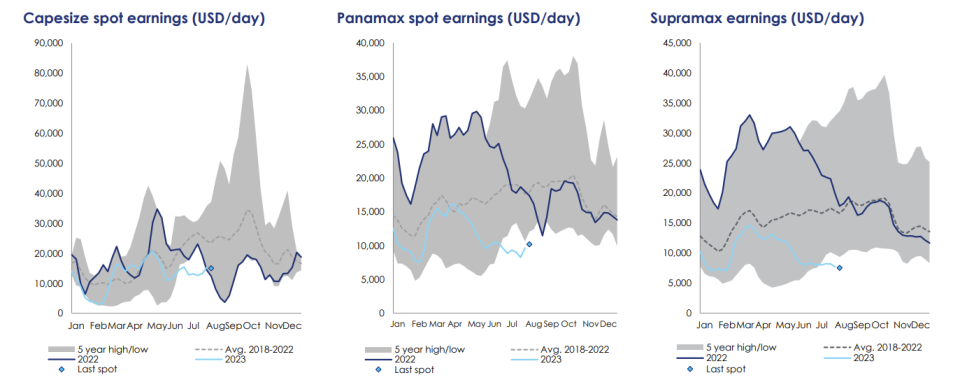Container shipping’s Danaos buys into dry bulk amid rate slump

Traditional shipowning families often don’t behave like retail stock traders focused on the next few quarters. Longtime shipowners focus on building multigenerational wealth across cycles — even if they run public companies whose shareholders covet near-term gains.
If a particular shipping segment is weak and vessel prices look cheap, family shipowners may be tempted to buy counter-cyclically, even if these acquisitions drag down near-term results, and even if their shareholders had no intention of investing in that kind of ship.
Danaos (NYSE: DAC), a container-ship owner sponsored by Greece’s Coustas family — which has been in the shipping business for 60 years — is the latest in a long line of public shipowners that have made the leap into a different vessel segment.
Danaos is now using some of the windfall profits it earned during the COVID-era container shipping boom to branch out into dry bulk, a sector that has performed much worse than expected this year.
Expansion into dry bulk shipping
Danaos bought 1.33 million shares of Eagle Bulk (NYSE: EGLE) in the second quarter for $68.2 million, equating to a 16.7% stake. In response, Eagle Bulk enacted a “poison pill” and bought out the 28% stake owned by investment fund Oaktree.
Eagle Bulk owns midsize bulkers with capacities of 56,000-64,000 deadweight tons (DWT). To complement this midsize-bulker exposure, Danaos bought five larger 2010- to 2012-built Capesize bulkers (with average capacity of 175,000 DWT) in July for an aggregate price of $103 million.
Danaos said it bought Eagle Bulk shares at a “significant discount” to net asset value. Meanwhile, the price of 10-year-old Capesizes has fallen 13% since May and 18% year on year, according to data from Clarksons Securities.
“In the dry bulk market, the secret is you have to buy cheaply,” said Danaos CEO John Coustas on Monday’s quarterly call. “If you buy at the top of the market, you will very rarely recover your investment.” (Danaos owned dry bulk ships when it was private, but exited the sector after its 2006 IPO.)
“We are not going to invest in dry bulk at whatever the price in order to diversify,” Coustas said, noting that Danaos will only do so at attractive prices. “We are very sensitive to cost.”
Dry bulk freight rates have suffered this year from an unwinding of port congestion, weak demand due to a slower-than-expected Chinese recovery, and relatively low scrapping of older vessels. Clarksons Securities’ data shows that current dry bulk spot rates are around half their five-year averages.

Coustas didn’t sound like he expected a dry bulk rate recovery soon. He said that Eagle Bulk’s market “is going to be very challenging in the next couple of quarters, at least.”
Container shipping opportunities dry up
Asked whether Danaos would buy more container ships, Coustas said, “We do not see any interesting opportunities in the container market. There are opportunities with older ships, but I believe we need to look at the future — at only very modern tonnage and possibly newbuildings.”
Danaos placed orders for two 8,258-twenty-foot-equivalent-unit container-ship newbuildings in June, bringing its orderbook to 10 vessels with aggregate capacity of 74,914 TEUs for deliveries in 2024-2026. All of its newbuildings allow for methanol-fuel retrofits.
“We are investing in new [container] ships that will be able to utilize green fuels,” said Coustas. “That is not just part of our strategy, it is a requirement for the longevity of the company.
“The IMO [International Maritime Organization] is committed to forcing shipping into a greener environment. Anyone who doesn’t really get it and believes it’s going to be business as usual is going to be in for a surprise within the next few years.”
Adjusted earnings keep pace with 2022
Danaos, the world’s sixth-largest container-ship lessor, is one of the best-performing U.S.-listed shipping stocks of 2023. Its share price is up 32% year to date despite pushback from some retail traders on the new dry bulk play.
The company reported adjusted net income of $143.4 million in Q2 2023, compared to $157.1 million in Q2 2023.
In the second quarter of last year, Danaos benefited from its stake in container liner operator Zim (NYSE: ZIM), which it no longer owns. Excluding the effect of Zim dividends, Danaos’ adjusted net income in Q2 2023 was flat year on year.
Danaos had $653.3 million in total liquidity at the end of June, including $293.3 million in cash. It concluded 12 charters in Q2 2023, with 99.4% of its container-ship capacity now locked up on charters this year and 86.1% next year.
Even though the container shipping boom is over, Danaos’ average charter rate actually increased 2% in Q2 2023 versus Q2 2022, to $39,548 per day.
Jefferies analyst Omar Nokta believes Danaos’ shares still have room to run. “The market is ascribing no value to the earnings on its fleet’s remaining uncontracted days, nor to its scrap value of $1 billion,” he said.

Click for more articles by Greg Miller
Related articles:
Corporate governance in shipping: Who’s been naughty or nice?
Shipping faces fallout as China’s post-COVID rebound falls flat
Hello, goodbye: Shipping’s latest entries and exits on Wall Street
Five years on Wall Street: Shipping’s exits, arrivals, whales and minnows
Shipping on Wall Street: Is it better to be a pure play or jack-of-all-trades?
When shipping stocks sold as one thing become something else
Shipping’s Wall Street saga: Rags to riches to rags to occasional riches
The post Container shipping’s Danaos buys into dry bulk amid rate slump appeared first on FreightWaves.
